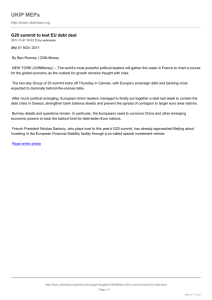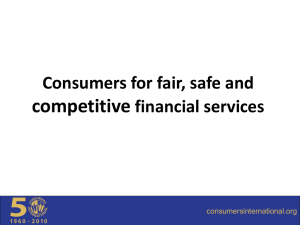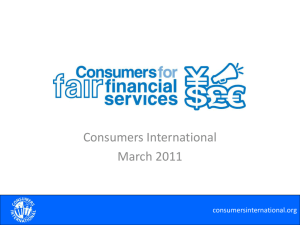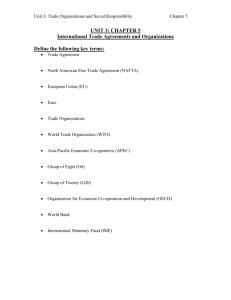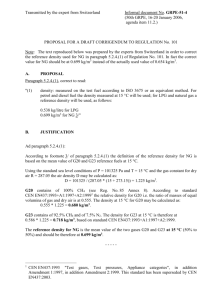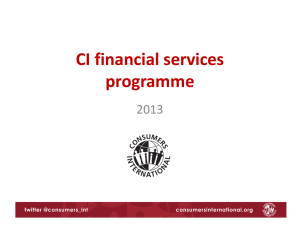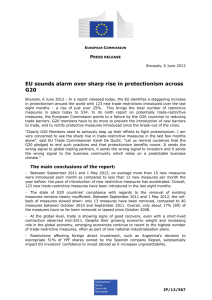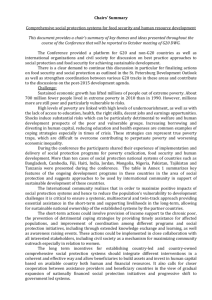G20 Briefing - Stakeholder Forum
advertisement
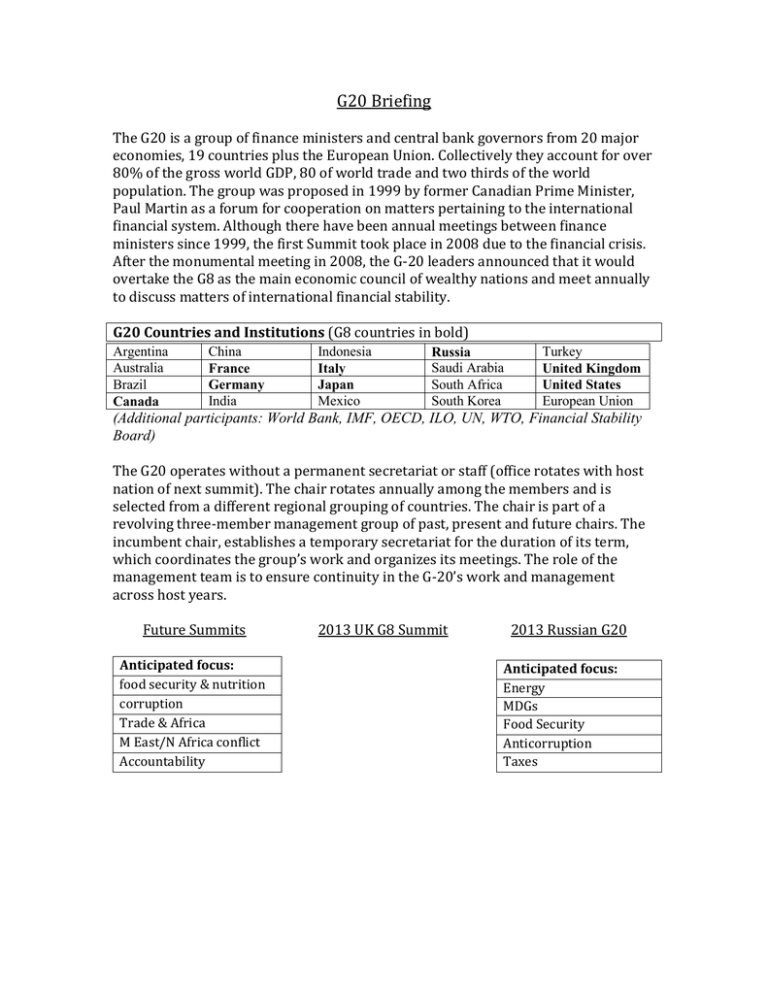
G20 Briefing The G20 is a group of finance ministers and central bank governors from 20 major economies, 19 countries plus the European Union. Collectively they account for over 80% of the gross world GDP, 80 of world trade and two thirds of the world population. The group was proposed in 1999 by former Canadian Prime Minister, Paul Martin as a forum for cooperation on matters pertaining to the international financial system. Although there have been annual meetings between finance ministers since 1999, the first Summit took place in 2008 due to the financial crisis. After the monumental meeting in 2008, the G-20 leaders announced that it would overtake the G8 as the main economic council of wealthy nations and meet annually to discuss matters of international financial stability. G20 Countries and Institutions (G8 countries in bold) Argentina Australia Brazil Canada China France Germany India Indonesia Italy Japan Mexico Russia Saudi Arabia South Africa South Korea Turkey United Kingdom United States European Union (Additional participants: World Bank, IMF, OECD, ILO, UN, WTO, Financial Stability Board) The G20 operates without a permanent secretariat or staff (office rotates with host nation of next summit). The chair rotates annually among the members and is selected from a different regional grouping of countries. The chair is part of a revolving three-member management group of past, present and future chairs. The incumbent chair, establishes a temporary secretariat for the duration of its term, which coordinates the group’s work and organizes its meetings. The role of the management team is to ensure continuity in the G-20’s work and management across host years. Future Summits Anticipated focus: food security & nutrition corruption Trade & Africa M East/N Africa conflict Accountability 2013 UK G8 Summit 2013 Russian G20 Anticipated focus: Energy MDGs Food Security Anticorruption Taxes Year 2013 2014 2015 2016 G8 UK Russia Germany Japan G20 Russia Australia Turkey 2017 Italy 2018 Canada The agenda items of each summit are broken into working groups and expert groups. They are both established when needed to support the work of leaders, finance ministers, central bank governors and Sherpas* (G20 leaders’ personal representatives). Both groups are generally co-chaired by one advanced and one emerging economy. The themes of the working groups are not permanent and fluctuate between G20 presidencies. *Sherpas The Sherpas carry out important planning, negotiation and implementation tasks throughout the entire process. They coordinate the agenda, seek consensus at the highest political levels and help negotiate the Leaders’ positions. In addition, the Sherpa is also responsible for holding frequent meetings with business and civil society. Toward the end of the process, along with the Deputy Finance Ministers, the Sherpas prepare the final declaration statement and other supporting documents for the Leaders. Mexican G20’s Presidency’s Working Groups Sherpa’s Track Employment & Social Dimension of Globalization Food Security Development Anti-Corruption Multilateral Trade Finance Minister’s Track Working Group on Framework for Growth Strengthening of the International Financial System Working Group on International Financial Architecture Working Group on Energy and Commodity Markets Study group on Climate Finance G20 civil society representation Until recently non-state actors have had little involvement in the G20 process. However the previous Summit hosted by Mexico, made inclusion a priority, holding dialogues (see below for themes) with business, labor, academia and NGOs. The papers produced at these dialogues were hosted on the official G20 website with a corresponding calendar of CSO side events. The Mexican presidency accredited all CSOs that wanted to attend the Summit and granted them full access to the media centre and a separate “cultural pavilion” for exhibitions. Additionally, CSOs were briefed daily by the presidency on the summit’s proceedings. CSOs are unable to formally participate in the working groups but are able to submit their recommendations to their respective nation’s Sherpas and Finance Ministers. Similar to the Rio+20 process, brief recommendations should be submitted 6-8 months prior to the Summit. In the UK, CSOs can have group consultations with the Sherpa from the UK cabinet office (Ivan Rogers) and the designated G20 Financial Minister from DFID. Meetings with the Sherpa generally happen once before and after the Summit, while meetings with the G20 representative occur quarterly. The Bond development group coordinates these meetings and administers an online discussion group and newsletter for CSOs involved in the G20. For 2013, the Russian Presidency has already conducted meetings on the role of civil society in forming the G20 agenda. The Presidency has stated that civil society will be able to provide extensive input on the issues of sustainable development and social welfare. The Russian Presidency has already begun dialogues with Russian NGOs and is planning to conduct further dialogues with Global NGOs between September and December (a calendar of Civil Society’s activities under Russian Presidency is attached). Mexico’s CSO Dialogue Themes 1. Economic stabilization and structural reforms for growth and employment. 2. Financial systems and promoting financial inclusion to boost economic growth. 3. International financial architecture in an interconnected global economy. 4. Food security and price volatility of raw materials. 5. Sustainable development, green growth and fight against climate change. CSO’s that submitted position papers for the G20 in Mexico 1000 Days (Pregnant women’s nutrition) Anglican Alliance (Religious charity that addresses poverty and development) Australian Council for International Development (Aid for poverty) Bond (UK international development) Consumers International (consumer information on safe and sustainable goods) Coordination SUD (French NGO coalition that works on a wide range of social, economic and environmental issues). Heinrich Böll Foundation (green think tank) InterAction (U.S. faith based alliance of ngos) International Federation of Red Cross and Red Crescent Societies (world's largest humanitarian organization) Joint Religious Coordination for the G8 and G20 Summits (alliance of religious leaders) LATINDADD (Latin American Network on Debt Development and Rights) Observatorio Mexicano de la Crisis (center that analyzes social, economic and environmental crises) Oxfam America (Poverty and injustice) One (fights poverty and preventable diseases in Africa) Save the Children (Children’s poverty, education and hunger) Task Force on Financial Integrity & Economic Development (consortium of governments and advocacy organizations which focus on financial transparency) World Vision (community development, disaster relief and advocacy) Helpful resources http://www.g20civil.com/index.php http://www.g20.org/ http://www.g20.utoronto.ca/ http://en.wikipedia.org/wiki/G-20_major_economies http://www.cigionline.org/project/g20
